Delivery & Shipping
Group Ordering in Delivery Apps: Benefits of Split the Bill Feature
September 15, 2023 • 751 Views • 14 min read
Bohdan Vasylkiv
CEO & Co-Founder
As we already figured out, the group dinners feature in demand delivery apps like Uber Eats is a great optional functionality, worth considering for implementation for numerous reasons.
Today, we would like to talk more about the related functional characteristics, which are as important as the rest approaches, which make it possible to develop a delivery application with built-in group delivery capabilities. To be more specific - we are talking about the possibility to split costs between multiple people.
But first, let’s summarize the key approaches of group order development.
The Importance of Personal Accounts
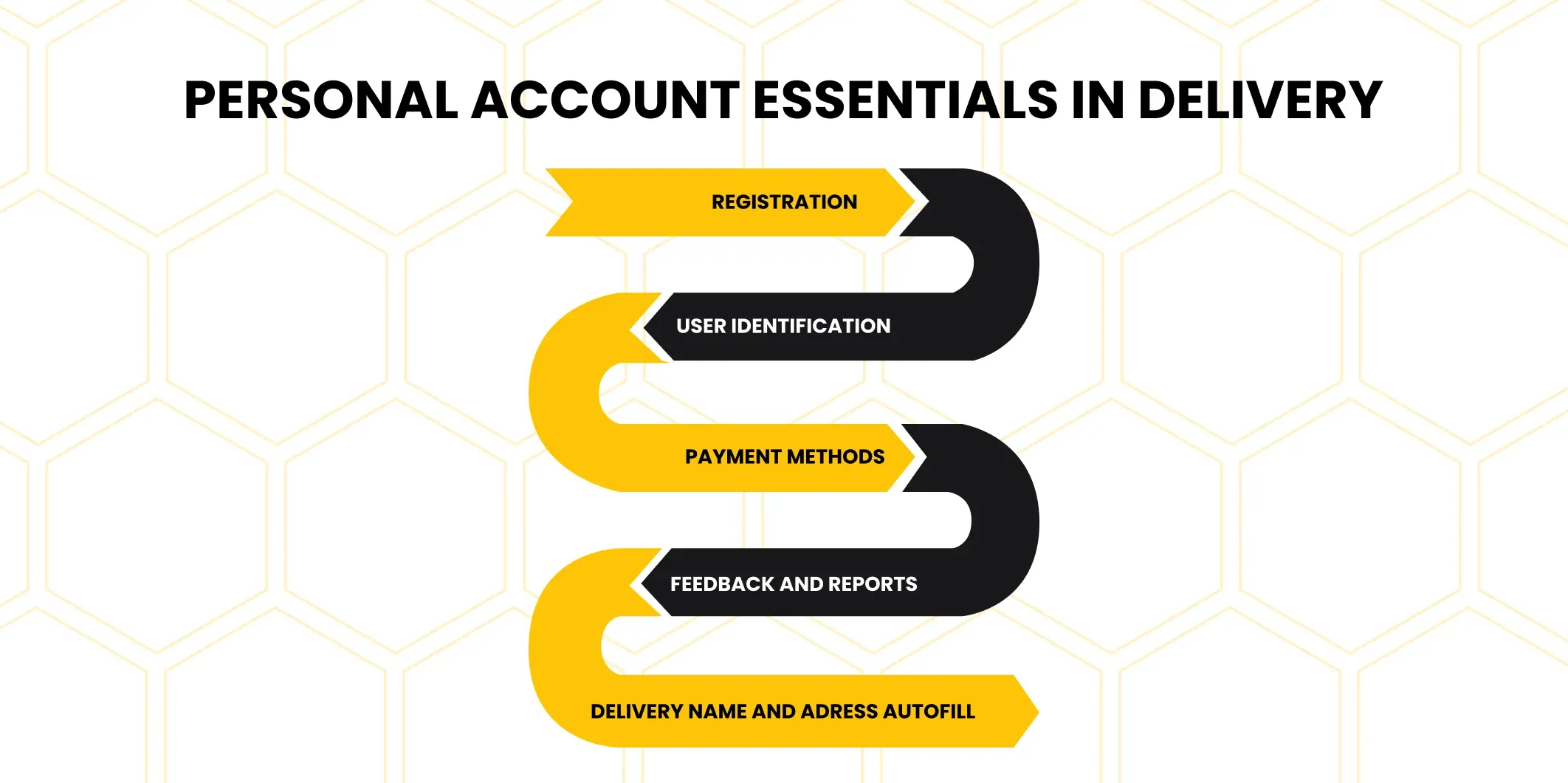
Despite the same purpose of such app functionality, there is a wide range of possible ways on how do make it real.
The only key aspect, which will be the same for each of the approaches is the personal account, which is a must-have feature for any type of delivery service, regardless of whether it supports large parties group meal delivery, or not.
Personal Account allows the delivery service to maintain app user requests, propose birthday dinner, monitor their activity, enable fraud detection, risk management, order tracking, and pay for the delivery in-app with the use of any payment method, etc.
Additionally, with the help of the rest key features of demand-driven delivery apps, it becomes possible to store the order history of customers and propose similar meals or other services, they might be interested in.
Eventually, the personal account feature allows most of the activities in the app, making the lives of their owners and dedicated development team members easier and significantly improving the user experience.
Thus, to sum up, a personal account is not an optional, but essential functionality, which can’t be ignored and must be included in any software in the field of delivery services.
Yet, this is not the final list of possible use cases for this feature. To make it simple, it enables group orders as well.
The Role of Personal Accounts in Group Ordering
As mentioned before, one of the crucial aspects of personal accounts in delivery apps is the possibility of linking the payment methods and paying the delivery cost. It can include numerous payment options, starting with ApplePay or other mobile wallets, ending with personal credit cards, or even blockchain solutions like NFT wallets and similar digital assets.
When it comes to group orders, personal accounts will play two different roles at once:
- User person identification
- Order Payment
Let’s start with the easier one first.
Clearly, logging in to your personal account in an app for food delivery allows you to identify each person in the collective order cart. It gives you the possibility to know exactly what each of the members ordered in the entire bill.
It is especially important when you decide to make a group order activation link as a useful way to share the same order in just a few clicks.
However, the second role of individual accounts in terms of such functionality is not as simple, as it may seem.
Personal Accounts and Splitting Bills Feature
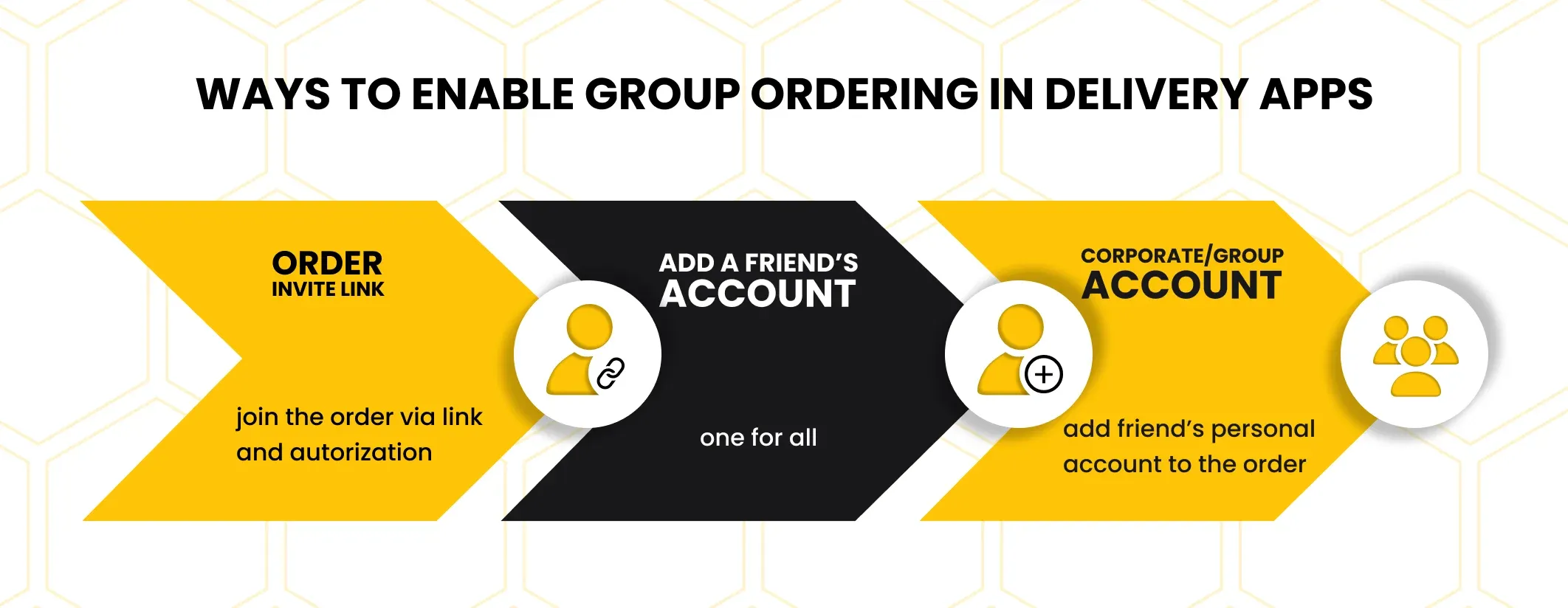
Obviously, one of the main operational requirements for group delivery is the ability to split bill evenly in-app. Otherwise, there is no need for integrating such a feature, because it would be easier to simply order the food delivery for the whole team from a single group bill account.
Therefore, in order to make it possible to split evenly for all party members, we have to first identify them and then send separate checks to each individual member.
How exactly are you going to charge the delivery fee from each member is not that important, yet the easiest way would be to simply charge them from their personal accounts.
Still, you can enable the redirection of funds from each individual account to the cart creator, a person, who ordered the meal, in case it would be difficult to proceed with each individual payment for the delivery separately.
Regardless of what exact approach you would choose, the main functional issue, your development team has to deal with - is to automate the money-transferring process. Frankly, it is not as difficult, as it may seem, and is partly similar to some functional aspects, developed in FinTech like Neobanking.
The rest of code-level development directly depends on the approach, you are considering to embody the “splitting the bill” feature.
Real-Life Examples of Bill Splitting Apps
For a better illustration, let’s consider some of the split the bill feature real-life examples, and how can you potentially adopt some of them.
Expirenza by Monobank
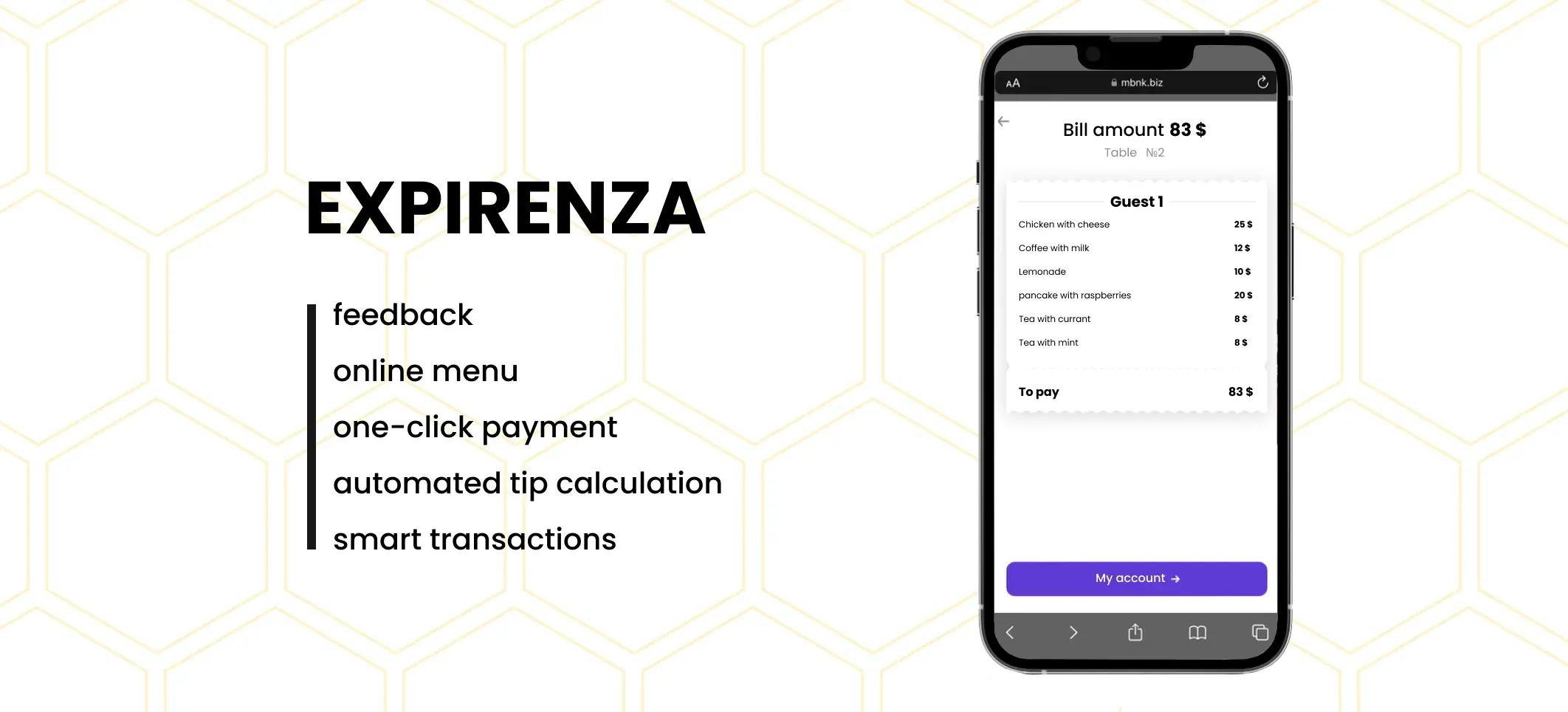
Before explaining this particular case, we have to admit, that it is not actually related to the delivery industry, yet implemented as a payment app or management feature for restaurants and cafes. Yet, the approach, in this scenario, is unique and quite simple, which does not affect its quality or usage possibilities.
Expirenza is an all-in-one software, developed by a Ukrainian online banking company Monobank. It proposes a few tested and already-developed functional usage purposes, designed to simplify the lives of both business owners and their customers.
It is distributed as a SaaS and is simply integrated into an existing restaurant management system as an API and works via QR codes, which are placed at separate tables or the registration desk and work as simple links. All the customer has to do in order to use the full potential of this extension - is to scan a QR code with their smartphones.
Among the proposed valuable features, we can name:
- possibility of leaving feedback
- online version of the menu
- easy payment in one click
- automated tip calculation(if needed)
- smart transactions: owners can add different business accounts like “Kitchen”, “Bar”, “Tips”, etc., to which the related payment is sent to
Additionally, the business owner has access to their personal accounts, where they can find analytics for a particular period of time, read the clients’ feedback, and see the current account budget.
However, the most interesting feature, we are here for is the ability to split bills. As a matter of fact, clients can easily split the bill for different users. So, with just a few clicks, customers can simply split the bill and pay for their orders. To do so, they simply scan the QR code and look for their order among all, linked to their table.
SplitWise App
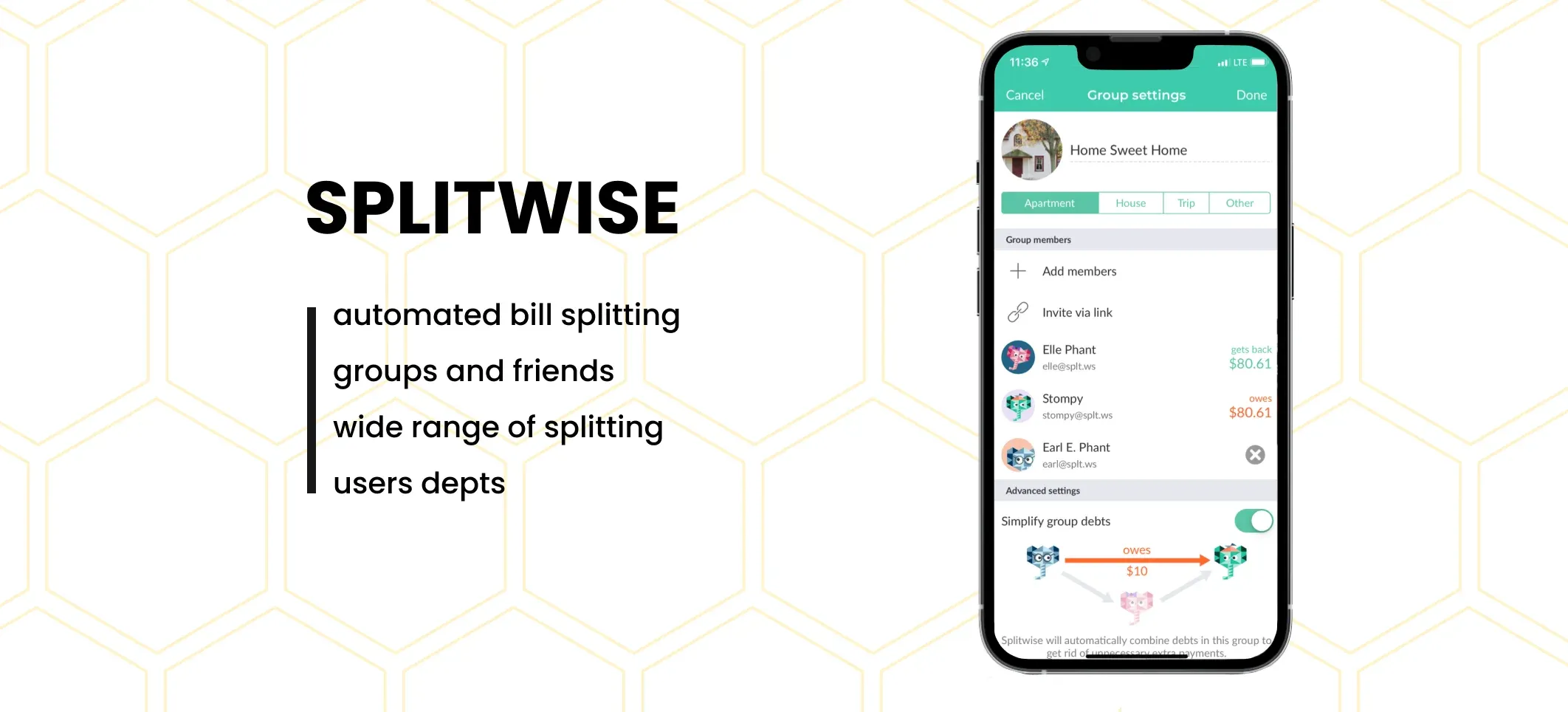
Another great illustration of bill-splitting apps is SplitWise.
It is a standalone mobile application, which provides its users with numerous solutions, related to the bill splitting process.
This simple usage purpose is compensated with a variety of ways to perform calculations. For instance, you were at a restaurant with your friends and ordered different meals. In such a case, you can simply define whether the bill split is equal for all, or unequal, defining each individual item.
Additionally, it automatically calculates the total amount of money for each participant, telling how much each person owes to friends. Besides, it records debts, proposes to split the total bill by % or fair share, slit evenly, or creates a separate check for everyone, offers expense categorization, etc. Finally, it allows payment systems integration, making it possible to pay all the depts in-app.
To make it simple, SplitWise is probably one of the best examples of applications, designed for bill splitting. The best part of this app is the fact, that it can be integrated into other third-party apps via SplitWise API, which potentially makes it possible to easily implement the “split the bill” feature as a ready-made solution. However, it does not mean, that there will be nothing to code.
Clearly, even ready-made SaaS solutions require a dedicated approach of niche-experienced developers, who are familiar with such types of software and understand how to use the full potential of various services and software.
ShareBite
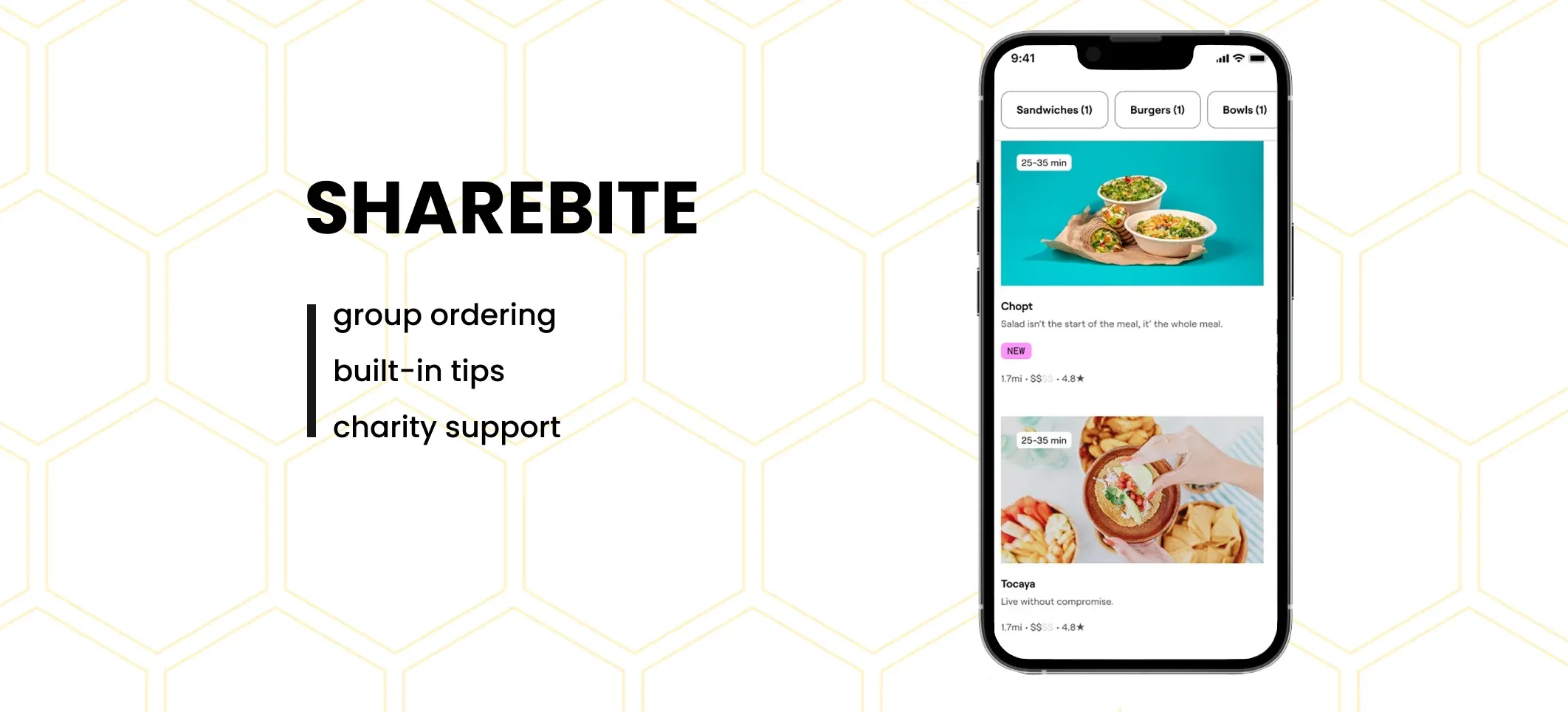
ShareBite is another example of a food delivery app with a specific approach to split apps.
One of the main and unique features of this application is the ability to perform extra online payments to shared expenses, which will be automatically redirected to charity organizations.
As a matter of fact, this feature works similarly to the “tips” from Expirenza, yet the only difference is the final purpose and recipient. It is a great example of how companies can bring some value to society by providing high-quality services and motivating their clients to spend some money for good purposes, giving them simple but effective methods to do so.
Split Bills Apps Development with Incora
When it comes to any type of software development outsourcing, it is essential to hire dedicated development team with proven experience.
Regardless of how complex and complicated your idea is to fulfill, you will only win from the experienced software engineers on board. Plainly speaking, unprofessional developers sometimes can struggle even with simple tasks, not to mention the full-fledged development of a standalone application with multiple third-party solutions, which, eventually must be integrated for a seamless and more efficient usage experience.
Therefore, finding an offshore development team of experts is the first and most important step in any development cycle, which will definitely impact the final result.
To make a more balanced choice, we recommend you to pay attention to the companies with proven experience in the industry, you are interested in. Still, having extra case studies from other fields can be also helpful for you: they are not only familiar with the industry on the code level but also can give you a piece of advice, related to the field, explain some specific to the in-house team, recommend particular tech stack to choose for better results, etc.
For instance, here at Incora, we have a full-grown in-house team of developers for hire, who are experts in specific niches like Blockchain and Cryptocurrency, FinTech, Delivery and Shipping, as well as other industries. The full list of industries, in which we have worked, accompanied with white label app development projects can be found in our case studies.
Hence, before contacting us, we recommend you examine some of our cases in order to better understand our experience and the types of applications, we can deliver.
What’s your impression after reading this?
Love it!
1
Valuable
1
Exciting
1
Unsatisfied
1
FAQ
Let us address your doubts and clarify key points from the article for better understanding.
What is the "Split the Bill" feature in delivery apps?
The "Split the Bill" feature in delivery apps allows users to divide the total cost of a food order among multiple people. It simplifies the process of sharing expenses when ordering food with friends or colleagues.
Can I customize how the bill is split?
Yes, you can often customize how the bill is split. You can allocate specific items or amounts to different individuals. This feature is useful when not everyone shares equally in the order.
What payment methods can I use to split the bill?
Most apps allow you to split the bill using various payment methods, such as credit/debit cards, digital wallets, or app-specific payment options. You can choose the method that works best for you and your friends.
What happens if someone doesn't pay their share of the bill?
If someone doesn't pay their share, it may be up to the person who initiated the split to cover the remaining amount. Some apps offer reminders and notifications to encourage timely payment.
Is the "Split the Bill" feature secure?
Most delivery apps prioritize security and use encryption to protect your payment information. However, it's essential to use secure passwords and enable two-factor authentication to further enhance security.
Is the "Split the Bill" feature available in all delivery apps?
Not all delivery apps offer the "Split the Bill" feature. It's important to check if the app you're using provides this option before relying on it for group orders.
you may also like
Let’s talk!
This site uses cookies to improve your user experience. Read our Privacy Policy
Accept

Share this article